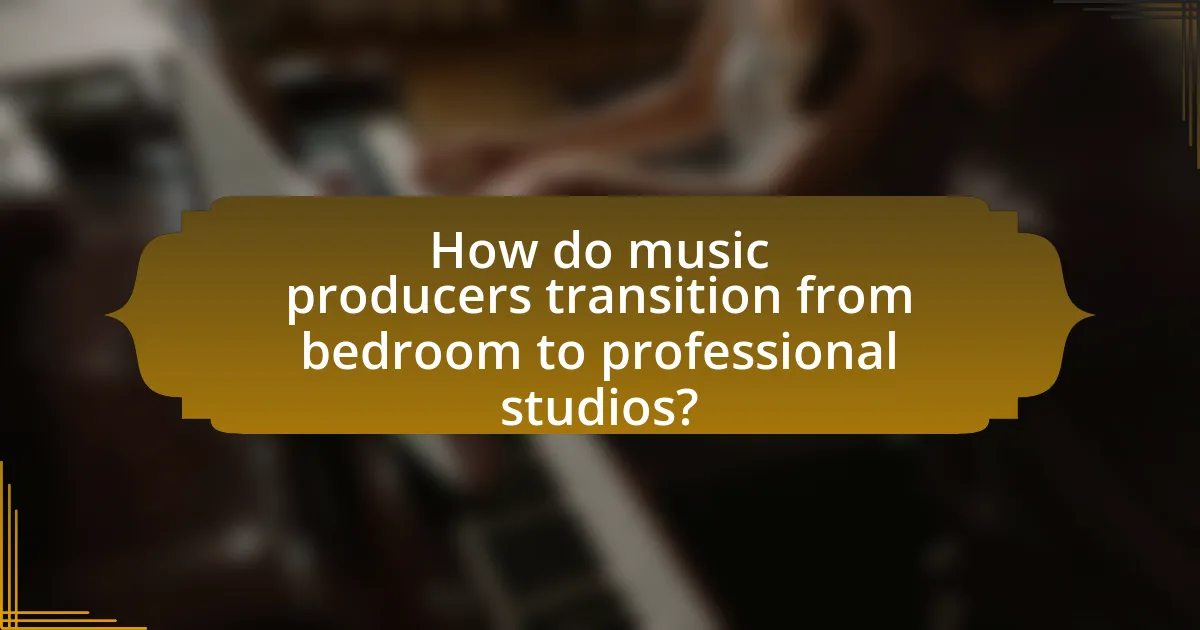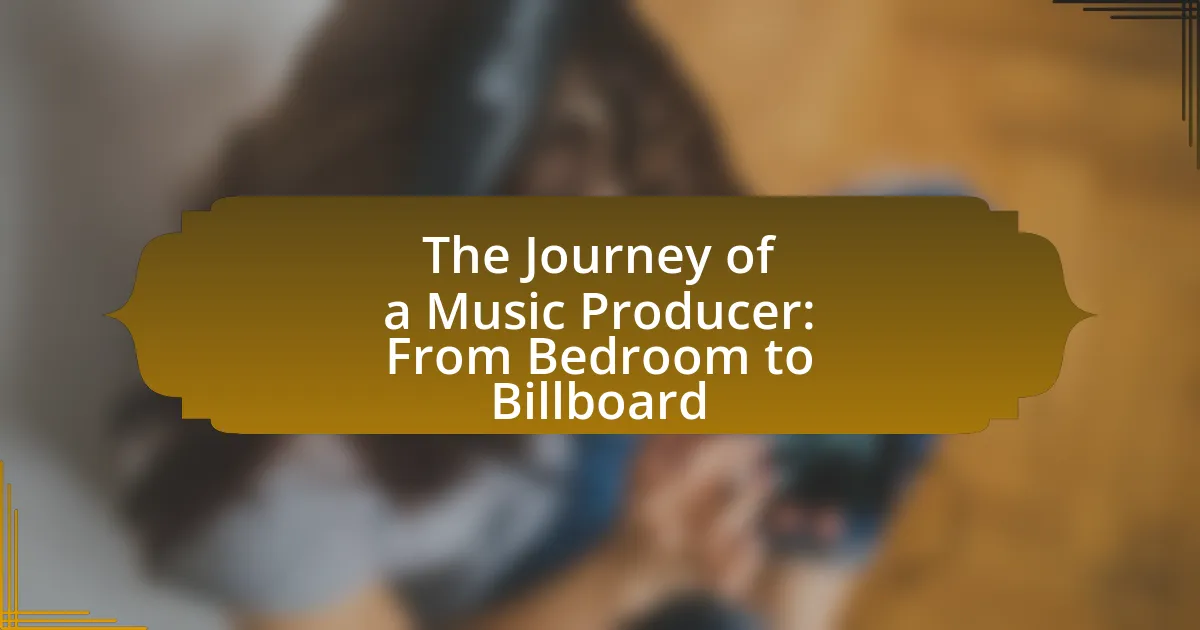The article explores the journey of a music producer, detailing the progression from initial passion and home studio experimentation to professional recognition and success in the music industry. It outlines essential skills for budding producers, the importance of networking, and the challenges faced in the early stages of their careers. Key milestones, such as securing major projects and achieving chart success, are highlighted, along with practical tips for continuous learning and effective marketing strategies. Additionally, the article discusses the impact of technology and current trends shaping the future of music production, providing a comprehensive overview of the factors contributing to a producer’s success.

What is the journey of a music producer?
The journey of a music producer typically begins with a passion for music and sound, often starting in a home studio or bedroom where they experiment with recording and mixing. As they develop their skills, they may collaborate with local artists, gaining experience and building a portfolio. This initial phase is crucial for learning the technical aspects of production, such as using digital audio workstations and understanding music theory.
As a music producer gains recognition, they may secure opportunities to work with more established artists or record labels, leading to professional projects. This transition often involves networking within the industry, attending events, and leveraging social media to showcase their work. Successful producers often have a unique sound or style that sets them apart, which can attract high-profile collaborations.
The journey can culminate in significant achievements, such as chart-topping hits or Grammy nominations, reflecting the producer’s growth and influence in the music industry. For instance, notable producers like Pharrell Williams and Max Martin started from humble beginnings and have since shaped the sound of contemporary music, demonstrating the potential trajectory of a music producer’s career.
How does a music producer start their career?
A music producer starts their career by gaining knowledge of music production techniques and building a portfolio of work. This often involves learning to use digital audio workstations (DAWs) and understanding sound engineering principles. Many producers begin by creating music in their own home studios, collaborating with local artists, and experimenting with different genres to develop their unique sound. Networking within the music industry, attending workshops, and seeking internships can also provide valuable experience and connections. According to a survey by the Music Producers Guild, 70% of successful producers reported that networking played a crucial role in their career advancement.
What skills are essential for a budding music producer?
Essential skills for a budding music producer include technical proficiency in music production software, a strong understanding of music theory, creativity in sound design, and effective communication skills. Technical proficiency allows producers to navigate digital audio workstations (DAWs) like Ableton Live or Pro Tools, which are crucial for recording and editing music. A solid grasp of music theory aids in composing and arranging tracks, ensuring musical coherence. Creativity in sound design enables producers to craft unique sounds and textures, setting their work apart in a competitive industry. Effective communication skills are vital for collaborating with artists, musicians, and other industry professionals, facilitating a productive creative process. These skills collectively contribute to a music producer’s ability to create high-quality music that resonates with audiences.
How does one build a home studio for music production?
To build a home studio for music production, one should start by selecting an appropriate space that is quiet and free from distractions. This space should ideally have soundproofing or acoustic treatment to minimize external noise and improve sound quality. Essential equipment includes a computer with a digital audio workstation (DAW) software, an audio interface for connecting instruments and microphones, studio monitors for accurate sound playback, and headphones for detailed listening.
Additionally, incorporating a MIDI keyboard can enhance music creation, while microphones and stands are necessary for recording vocals and instruments. Proper cabling and power management are also crucial for maintaining an organized setup. According to a survey by Sound on Sound, 70% of home studio owners report that investing in quality monitors significantly improved their mixing accuracy, underscoring the importance of selecting the right equipment.
What challenges do music producers face in the early stages?
Music producers face several challenges in the early stages, primarily including limited resources, lack of industry connections, and difficulty in establishing a unique sound. Limited resources often manifest as insufficient access to high-quality equipment and software, which can hinder the production quality of their work. Additionally, without established industry connections, new producers struggle to find opportunities for collaboration, promotion, and distribution, making it harder to gain visibility. Establishing a unique sound is crucial in a saturated market, yet many early-stage producers find it challenging to differentiate themselves from others, which can impede their ability to attract listeners and clients.
How can a music producer overcome creative blocks?
A music producer can overcome creative blocks by implementing structured techniques such as setting specific goals, changing the environment, and collaborating with other artists. Setting clear, achievable goals helps to focus creativity and provides direction, while altering the workspace can stimulate new ideas and perspectives. Collaboration introduces fresh influences and ideas, which can reignite inspiration. Research indicates that diverse collaboration can enhance creativity, as seen in studies by the American Psychological Association, which highlight the benefits of social interaction in creative processes.
What financial hurdles do aspiring music producers encounter?
Aspiring music producers encounter several financial hurdles, including high costs for equipment, software, and studio time. The initial investment for quality recording equipment can exceed $5,000, while professional software licenses can range from $200 to over $1,000. Additionally, renting studio space can cost between $50 to $200 per hour, making it difficult for new producers to access necessary resources. These financial barriers often limit their ability to produce high-quality music and compete in the industry.

How do music producers transition from bedroom to professional studios?
Music producers transition from bedroom to professional studios by building a portfolio, networking with industry professionals, and gaining experience through collaborations. Initially, producers create high-quality tracks in their home studios to showcase their skills. As they develop their sound and gain recognition, they connect with artists, other producers, and industry insiders, often through social media or local music events. This networking leads to opportunities to work in professional studios, where they can access better equipment and resources. According to a survey by SoundOnSound, 70% of successful producers started in home studios before moving to larger facilities, highlighting the common pathway of skill development and industry connections.
What steps are involved in gaining industry recognition?
To gain industry recognition as a music producer, one must follow several key steps. First, developing a unique sound and style is essential, as this differentiates a producer in a competitive market. Next, building a strong portfolio by producing high-quality tracks and collaborating with various artists showcases skills and versatility. Networking within the industry is crucial; attending events, joining music groups, and connecting with other professionals can lead to valuable opportunities. Additionally, leveraging social media and music platforms to promote work increases visibility and reach. Finally, seeking feedback and continuously improving through education and practice solidifies a producer’s reputation. These steps collectively contribute to establishing a recognized presence in the music industry.
How can networking impact a music producer’s career?
Networking can significantly impact a music producer’s career by providing access to industry contacts, collaboration opportunities, and potential clients. Establishing relationships with artists, other producers, and industry professionals can lead to collaborations that enhance a producer’s portfolio and visibility. For instance, a study by the Berklee College of Music found that 70% of music industry jobs are filled through networking, highlighting its importance in career advancement. Additionally, networking can facilitate introductions to record labels and music supervisors, which are crucial for securing projects and placements.
What role do social media and online platforms play in promotion?
Social media and online platforms serve as crucial tools for promotion in the music industry by enabling artists to reach a global audience quickly and cost-effectively. These platforms facilitate direct engagement between artists and fans, allowing for real-time feedback and community building. For instance, according to a 2021 report by the International Federation of the Phonographic Industry, 70% of music consumers discover new music through social media. This statistic underscores the significant impact that platforms like Instagram, TikTok, and YouTube have on music promotion, as they allow producers to showcase their work, collaborate with other artists, and leverage viral trends to enhance visibility.
What are the key milestones in a music producer’s career?
Key milestones in a music producer’s career include gaining initial experience, securing a first major project, achieving commercial success, and establishing a personal brand. Initially, many producers start by creating music in home studios, which allows them to develop their skills and build a portfolio. The first major project often involves working with an established artist or label, which can lead to increased visibility and credibility in the industry. Achieving commercial success is marked by chart-topping hits or critically acclaimed albums, which can significantly elevate a producer’s reputation. Finally, establishing a personal brand involves creating a unique sound and identity, often leading to collaborations with other artists and opportunities in various media, such as film and television. These milestones are essential for progression and recognition in the competitive landscape of music production.
How does one secure their first major project?
To secure their first major project, a music producer should build a strong portfolio showcasing their best work and network actively within the industry. A well-curated portfolio demonstrates skills and creativity, making it easier to attract potential clients or collaborators. Networking is crucial; attending industry events, collaborating with other artists, and leveraging social media platforms can lead to opportunities. According to a survey by SoundOnSound, 70% of music producers find their first major project through personal connections and referrals, highlighting the importance of relationships in the music industry.
What does it take to collaborate with established artists?
Collaborating with established artists requires a combination of networking, showcasing talent, and understanding the industry. Music producers must build relationships within the industry, often through attending events, engaging on social media, or leveraging mutual contacts. Demonstrating unique skills or a distinctive sound can attract the attention of established artists, as they seek fresh perspectives. Additionally, having a solid portfolio that includes previous work can serve as proof of capability, making producers more appealing collaborators. Successful collaborations often stem from a producer’s ability to align their vision with that of the established artist, ensuring a mutually beneficial partnership.
What factors contribute to a music producer’s success on the Billboard charts?
A music producer’s success on the Billboard charts is primarily influenced by their ability to create commercially appealing music, effective collaboration with artists, and strategic marketing efforts. Commercial appeal is achieved through understanding current trends, incorporating popular sounds, and crafting catchy melodies that resonate with listeners. Collaboration with artists enhances the quality of the music, as successful producers often work with established musicians who have their own fan bases, thereby increasing exposure. Additionally, strategic marketing, including social media promotion and playlist placements, plays a crucial role in reaching wider audiences and driving sales. For instance, producers like Max Martin have consistently topped the charts by leveraging these factors, resulting in numerous Billboard Hot 100 hits.
How do music producers create chart-topping hits?
Music producers create chart-topping hits by combining technical skills, creativity, and market understanding. They start by identifying popular trends and sounds that resonate with audiences, often analyzing data from streaming platforms and radio play to inform their choices. Producers collaborate with songwriters and artists to craft catchy melodies and relatable lyrics, ensuring the song has mass appeal. They utilize advanced production techniques, such as layering sounds, adding effects, and optimizing the mix to enhance the track’s quality. Successful examples include producers like Max Martin, who has been behind numerous Billboard hits, demonstrating the effectiveness of this approach through his extensive catalog of chart-topping songs.
What techniques are used in songwriting and arrangement?
Songwriting and arrangement techniques include melody creation, chord progression, lyric writing, and structural organization. Melody creation involves crafting a memorable tune that resonates with listeners, while chord progression establishes the harmonic foundation of a song, often following common patterns like I-IV-V. Lyric writing focuses on conveying emotions and storytelling, utilizing techniques such as rhyme schemes and imagery. Structural organization refers to the arrangement of sections like verses, choruses, and bridges, which can follow traditional formats such as verse-chorus-verse or more experimental structures. These techniques are essential for producing compelling music that engages audiences.
How important is the role of mixing and mastering in production?
Mixing and mastering are crucial in music production, as they significantly enhance the overall sound quality and listener experience. Mixing involves balancing individual audio tracks, adjusting levels, and applying effects to create a cohesive sound, while mastering is the final step that ensures the track sounds polished and consistent across various playback systems. According to a study by the Audio Engineering Society, well-mixed and mastered tracks can increase listener engagement by up to 30%, demonstrating their importance in achieving professional sound quality.
What trends are shaping the future of music production?
The future of music production is being shaped by trends such as the rise of artificial intelligence, increased accessibility of production tools, and the growing importance of remote collaboration. Artificial intelligence is revolutionizing music creation by enabling software to assist in composing, mixing, and mastering tracks, as evidenced by tools like OpenAI’s MuseNet and AIVA, which can generate original compositions. The accessibility of production tools has expanded significantly, with platforms like GarageBand and Ableton Live allowing aspiring producers to create high-quality music from home, contributing to a democratization of music production. Additionally, remote collaboration has become essential, especially post-pandemic, with artists and producers utilizing platforms like Splice and Soundtrap to work together across distances, reflecting a shift in how music is created and shared.
How is technology influencing music production techniques?
Technology is significantly influencing music production techniques by enabling greater accessibility, efficiency, and creativity in the music-making process. Digital audio workstations (DAWs) like Ableton Live and Logic Pro allow producers to record, edit, and mix music with unprecedented ease and precision. Additionally, advancements in software plugins and virtual instruments provide a vast array of sounds and effects that were previously only available in professional studios. According to a 2021 report by the International Federation of the Phonographic Industry, over 70% of music producers now utilize home studios equipped with technology that was once exclusive to commercial recording facilities, demonstrating how technology democratizes music production.
What genres are currently dominating the charts and why?
Pop and hip-hop are currently dominating the charts due to their widespread appeal and integration into mainstream culture. Pop music’s catchy melodies and relatable lyrics resonate with a broad audience, while hip-hop’s rhythmic beats and storytelling elements attract diverse listeners. According to the Billboard Hot 100, pop and hip-hop tracks consistently occupy the top positions, reflecting their commercial success and cultural relevance. The rise of streaming platforms has further amplified these genres, allowing for greater accessibility and exposure to a global audience.
What practical tips can aspiring music producers follow to succeed?
Aspiring music producers can succeed by focusing on continuous learning, networking, and honing their technical skills. Continuous learning involves staying updated with industry trends, software advancements, and production techniques, which can be achieved through online courses, tutorials, and workshops. Networking is crucial; building relationships with other musicians, producers, and industry professionals can lead to collaboration opportunities and exposure. Additionally, honing technical skills in music production software, sound design, and mixing techniques is essential, as proficiency in these areas directly impacts the quality of the final product. According to a survey by the Music Producers Guild, 70% of successful producers attribute their success to a strong network and ongoing education in their craft.
How can one effectively market their music production services?
To effectively market music production services, one should leverage social media platforms, create a professional website, and network within the music industry. Social media platforms like Instagram, Facebook, and TikTok allow producers to showcase their work, engage with potential clients, and build a following. A professional website serves as a portfolio, providing samples of work, client testimonials, and contact information, which enhances credibility. Networking at industry events, collaborating with artists, and joining online music communities can lead to referrals and partnerships, increasing visibility and opportunities. According to a survey by SoundOnSound, 70% of music producers reported that networking significantly contributed to their client base growth.
What are the best practices for continuous learning in music production?
The best practices for continuous learning in music production include regularly engaging with online courses, participating in workshops, and collaborating with other musicians. Online platforms like Coursera and MasterClass offer structured courses taught by industry professionals, which can enhance technical skills and industry knowledge. Workshops provide hands-on experience and networking opportunities, allowing producers to learn from peers and experts. Collaboration with other musicians fosters creativity and exposes producers to different styles and techniques, further enriching their learning experience. These practices are supported by the growing trend of online education in the music industry, which has seen a significant increase in participation, indicating their effectiveness in skill development.
